单元语法小专题
单元语法小专题(Grammar Focus)
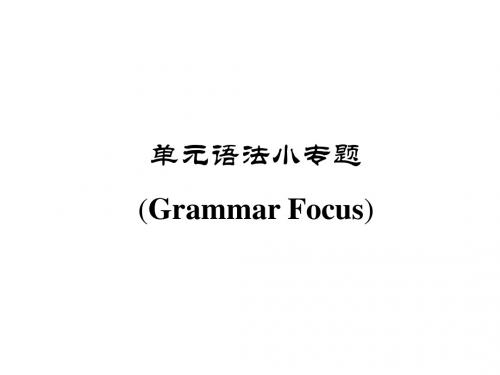
8.They go to the science club three times a week.(对画线部分提问)
How________ often do ________ they go to the science club? ________ 9.Frank usually listens to music in the evening.(对画线部分提问) What does do ________ ________ Frank usually ________ in the evening? 10.We have English lessons on Monday,Tuesday,Thursday
often,意为“多久一次”。如: —How often does Lisa go to the movies?丽萨多久看一次电影? —Never.从不。 6.频率副词或短语常与一般现在时连用。如:
I never eat meat.我从不吃肉。
Jim usually does his homework in the evening.吉姆通常晚上做作业。
Ⅱ.按要求完成下列句子,每空一词。
6.She washes clothes every Sunday.(改为否定句)
doesn't________ wash She ________ clothes every Sunday.
7.Jack usually does his homework at school.(改为一般疑问句) Does Jack ________ usually do ________ ________ his homework at school?
Sally doesn't often watch TV at the weekend.沙丽周末不常看电视。
人教版七年级英语上册Unit 2同步练习题及答案单元语法小专题(Grammar Focus)
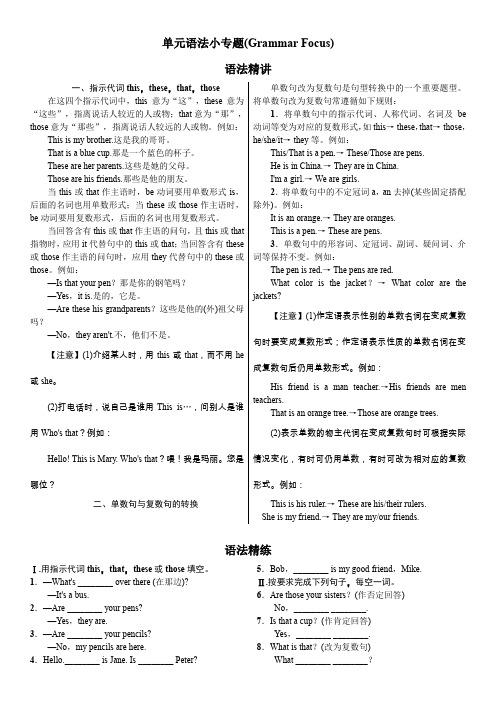
单元语法小专题(Grammar Focus)语法精讲一、指示代词this,these,that,those在这四个指示代词中,this意为“这”,these意为“这些”,指离说话人较近的人或物;that意为“那”,those意为“那些”,指离说话人较远的人或物。
例如:This is my brother.这是我的哥哥。
That is a blue cup.那是一个蓝色的杯子。
These are her parents.这些是她的父母。
Those are his friends.那些是他的朋友。
当this或that作主语时,be动词要用单数形式is,后面的名词也用单数形式;当these或those作主语时,be动词要用复数形式,后面的名词也用复数形式。
当回答含有this或that作主语的问句,且this或that 指物时,应用it代替句中的this或that;当回答含有these 或those作主语的问句时,应用they代替句中的these或those。
例如:—Is that your pen?那是你的钢笔吗?—Yes,it is.是的,它是。
—Are these his grandparents?这些是他的(外)祖父母吗?—No,they aren't.不,他们不是。
【注意】(1)介绍某人时,用this或that,而不用he 或she。
(2)打电话时,说自己是谁用This is…,问别人是谁用Who's that?例如:Hello! This is Mary. Who's that?喂!我是玛丽。
您是哪位?二、单数句与复数句的转换单数句改为复数句是句型转换中的一个重要题型。
将单数句改为复数句常遵循如下规则:1.将单数句中的指示代词、人称代词、名词及be 动词等变为对应的复数形式,如this→ these,that→ those,he/she/it→ they等。
例如:This/That is a pen.→ These/Those are pens.He is in China.→ They are in China.I'm a girl.→ We are girls.2.将单数句中的不定冠词a,an去掉(某些固定搭配除外)。
人教版七年级英语上册:Unit4 单元语法小专题【练习】

单元语法小专题(Grammar Focus~3c),01语法精讲一、方位介词的用法英语中,当要表示某人或某物在某地时,通常要借助于方位介词。
方位介词不能单独充当句子成分,必须与其他词或短语构成介词短语放在be动词或其他动词后面作表语或状语等,也可放在名词后作定语。
下面我们来看一下本单元学到的三个方位介词。
1.on意为“在……上”,表示一个物体在另一个物体的表面上。
例如:The book is on the desk.那本书在书桌上。
2.in意为“在……里”,表示一个物体在另一个物体的内部。
例如:The dictionary is in the schoolbag.字典在书包里。
3.under意为“在……下”,表示一个物体在另一个物体的正下方,但两个物体并不接触。
例如:Is the baseball under the chair?棒球在椅子下面吗?二、where引导的特殊疑问句1.用法where是疑问副词,意为“在哪里;到哪里”,用来引导特殊疑问句。
常用句型“Where is+单数名词/代词?”或“Where are+复数名词/代词?”询问人或物所在的位置。
例如:Where is my eraser?我的橡皮在哪里?Where is she?她在哪儿?Where are the keys?钥匙在哪里?Where are they?他们在哪儿?2.答语(1)用It's…(对应Where is…?)或They're…(对应Where are…?)作答。
例如:—Where is my eraser?我的橡皮在哪里?—It's in your pencil box.它在你的铅笔盒里。
—Where are the keys?钥匙在哪里?—They're under the bed.它们在床下面。
(2)直接说出物品所在地点,省略it's或they're。
例如:—Where's the clock?时钟在哪里?—On the wall.在墙上。
人教版九年级英语 习题 Unit 3 单元语法小专题
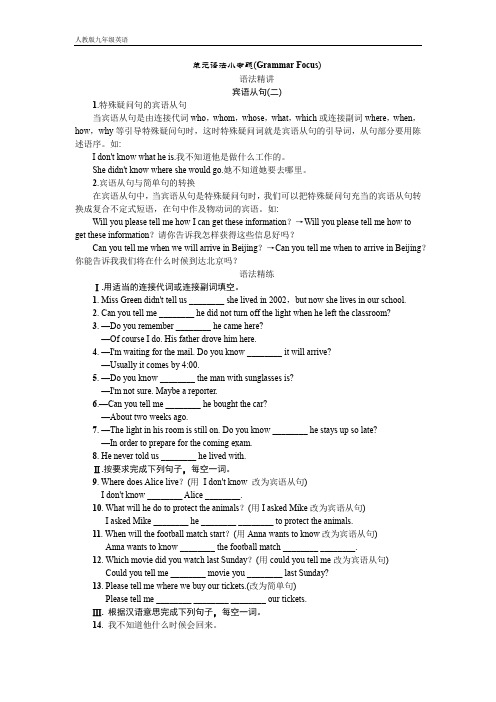
单元语法小专题(Grammar Focus)语法精讲宾语从句(二)1.特殊疑问句的宾语从句当宾语从句是由连接代词who,whom,whose,what,which或连接副词where,when,how,why等引导特殊疑问句时,这时特殊疑问词就是宾语从句的引导词,从句部分要用陈述语序。
如:I don't know what he is.我不知道他是做什么工作的。
She didn't know where she would go.她不知道她要去哪里。
2.宾语从句与简单句的转换在宾语从句中,当宾语从句是特殊疑问句时,我们可以把特殊疑问句充当的宾语从句转换成复合不定式短语,在句中作及物动词的宾语。
如:Will you please tell me how I can get these information?→Will you please tell me how toget these information?请你告诉我怎样获得这些信息好吗?Can you tell me when we will arrive in Beijing?→Can you tell me when to arrive in Beijing?你能告诉我我们将在什么时候到达北京吗?语法精练Ⅰ.用适当的连接代词或连接副词填空。
1. Miss Green didn't tell us ________ she lived in 2002,but now she lives in our school.2. Can you tell me ________ he did not turn off the light when he left the classroom?3. —Do you remember ________ he came here?—Of course I do. His father drove him here.4. —I'm waiting for the mail. Do you know ________ it will arrive?—Usually it comes by 4:00.5. —Do you know ________ the man with sunglasses is?—I'm not sure. Maybe a reporter.6.—Can you tell me ________ he bought the car?—About two weeks ago.7. —The light in his room is still on. Do you know ________ he stays up so late?—In order to prepare for the coming exam.8. He never told us ________ he lived with.Ⅱ.按要求完成下列句子,每空一词。
人教版七年级英语上册:Unit2 单元语法小专题【练习】
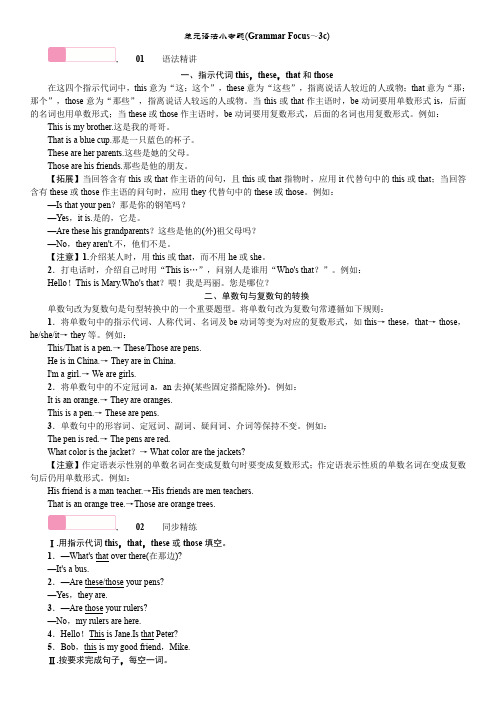
单元语法小专题(Grammar Focus~3c),01语法精讲一、指示代词this,these,that和those在这四个指示代词中,this意为“这;这个”,these意为“这些”,指离说话人较近的人或物;that意为“那;那个”,those意为“那些”,指离说话人较远的人或物。
当this或that作主语时,be动词要用单数形式is,后面的名词也用单数形式;当these或those作主语时,be动词要用复数形式,后面的名词也用复数形式。
例如:This is my brother.这是我的哥哥。
That is a blue cup.那是一只蓝色的杯子。
These are her parents.这些是她的父母。
Those are his friends.那些是他的朋友。
【拓展】当回答含有this或that作主语的问句,且this或that指物时,应用it代替句中的this或that;当回答含有these或those作主语的问句时,应用they代替句中的these或those。
例如:—Is that your pen?那是你的钢笔吗?—Yes,it is.是的,它是。
—Are these his grandparents?这些是他的(外)祖父母吗?—No,they aren't.不,他们不是。
【注意】1.介绍某人时,用this或that,而不用he或she。
2.打电话时,介绍自己时用“This is…”,问别人是谁用“Who's that?”。
例如:Hello!This is Mary.Who's that?喂!我是玛丽。
您是哪位?二、单数句与复数句的转换单数句改为复数句是句型转换中的一个重要题型。
将单数句改为复数句常遵循如下规则:1.将单数句中的指示代词、人称代词、名词及be动词等变为对应的复数形式,如this→ these,that→ those,he/she/it→ they等。
人教版(河北专版)九年级英语上册练习 Unit 1 单元语法小专题
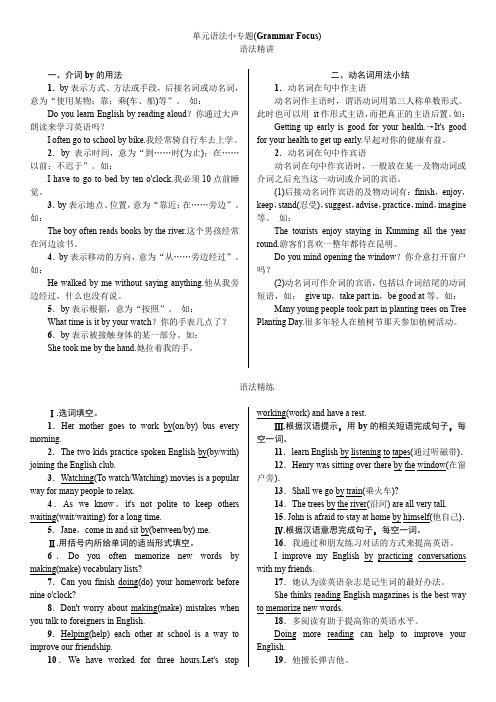
单元语法小专题(Grammar Focus)语法精讲一、介词by的用法1.by表示方式、方法或手段,后接名词或动名词,意为“使用某物;靠;乘(车、船)等”。
如:Do you learn English by reading aloud?你通过大声朗读来学习英语吗?I often go to school by bike.我经常骑自行车去上学。
2.by表示时间,意为“到……时(为止);在……以前;不迟于”。
如:I have to go to bed by ten o'clock.我必须10点前睡觉。
3.by表示地点、位置,意为“靠近;在……旁边”。
如:The boy often reads books by the river.这个男孩经常在河边读书。
4.by表示移动的方向,意为“从……旁边经过”。
如:He walked by me without saying anything.他从我旁边经过,什么也没有说。
5.by表示根据,意为“按照”。
如:What time is it by your watch?你的手表几点了?6.by表示被接触身体的某一部分。
如:She took me by the hand.她拉着我的手。
二、动名词用法小结1.动名词在句中作主语动名词作主语时,谓语动词用第三人称单数形式。
此时也可以用it作形式主语,而把真正的主语后置。
如:Getting up early is good for your health.→It's good for your health to get up early.早起对你的健康有益。
2.动名词在句中作宾语动名词在句中作宾语时,一般放在某一及物动词或介词之后充当这一动词或介词的宾语。
(1)后接动名词作宾语的及物动词有:finish,enjoy,keep,stand(忍受),suggest,advise,practice,mind,imagine 等。
2020年秋人教版八年级上册英语 unit 3单元语法小专题

单元语法小专题(Grammar Focus)语法精讲形容词、副词的比较级1.概念:英语中大多数形容词、副词有三个等级:原级、比较级和最高级。
两者比较用比较级;三者或三者以上相比用最高级。
比较的对象必须是属于同一性质或范畴的人或物。
【注意】比较的对象必须一致;比较的双方必须在同一范围内。
表示两者在某一方面相同时,用“as+形容词或副词原级+as”的句型。
如:I think science is as important as math.我认为科学和数学一样重要。
表示一方在某一方面不及另一方时,用“not as/so+形容词或副词原级+as”的句型。
如:It is not as/so warm today as yesterday.今天不如昨天暖和。
语法精练Ⅰ.用括号内所给单词的适当形式填空。
1.I think Sally did as ________(better) as Lucy in the math competition.2.Linda is much ________ (hard-working) than Anna.3.Who has ________ (many) books,Zhang Li or Li Ying?4.Do you think you are ________ (outgoing) than your father?5.It was cold yesterday,but it is much ________ (cold) today.6.This box is much ________(heavy),isn't it?7.Who is ________ (funny) than you in your class?8.I work ________(hard) this term,but David works even ________(hard).9.Which day was ________(hot),today or yesterday?10.This story is very ________(interesting),but that story is ________(interesting) than this one.Ⅱ.按要求完成下列句子,每空一词。
单元语法小专题(Grammar Focus)
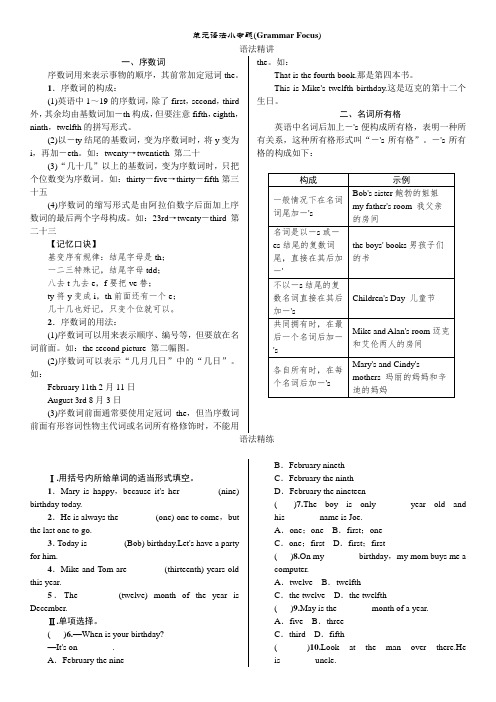
单元语法小专题(Grammar Focus)语法精讲一、序数词序数词用来表示事物的顺序,其前常加定冠词the。
1.序数词的构成:(1)英语中1~19的序数词,除了first,second,third 外,其余均由基数词加-th构成,但要注意fifth,eighth,ninth,twelfth的拼写形式。
(2)以-ty结尾的基数词,变为序数词时,将y变为i,再加-eth。
如:twenty→twentieth 第二十(3)“几十几”以上的基数词,变为序数词时,只把个位数变为序数词。
如:thirty-five→thirty-fifth第三十五(4)序数词的缩写形式是由阿拉伯数字后面加上序数词的最后两个字母构成。
如:23rd→twenty-third第二十三【记忆口诀】基变序有规律:结尾字母是th;一二三特殊记,结尾字母tdd;八去t九去e,f要把ve替;ty将y变成i,th前面还有一个e;几十几也好记,只变个位就可以。
2.序数词的用法:(1)序数词可以用来表示顺序、编号等,但要放在名词前面。
如:the second picture 第二幅图。
(2)序数词可以表示“几月几日”中的“几日”。
如:February 11th 2月11日August 3rd 8月3日(3)序数词前面通常要使用定冠词the,但当序数词前面有形容词性物主代词或名词所有格修饰时,不能用the。
如:That is the fourth book.那是第四本书。
This is Mike's twelfth birthday.这是迈克的第十二个生日。
二、名词所有格英语中名词后加上-'s便构成所有格,表明一种所有关系,这种所有格形式叫“-'s所有格”。
-'s所有格的构成如下:语法精练Ⅰ.用括号内所给单词的适当形式填空。
1.Mary is happy,because it's her ________(nine) birthday today.2.He is always the ________(one) one to come,but the last one to go.3.Today is ________(Bob) birthday.Let's have a party for him.4.Mike and Tom are ________(thirteenth) years old this year.5.The ________(twelve) month of the year is December.Ⅱ.单项选择。
- 1、下载文档前请自行甄别文档内容的完整性,平台不提供额外的编辑、内容补充、找答案等附加服务。
- 2、"仅部分预览"的文档,不可在线预览部分如存在完整性等问题,可反馈申请退款(可完整预览的文档不适用该条件!)。
- 3、如文档侵犯您的权益,请联系客服反馈,我们会尽快为您处理(人工客服工作时间:9:00-18:30)。
4.与其他句式之间的句型转换 (1)借助“祈使句+and (or)+一般将来时的句子”这一 句型来转换。and在句意上表示顺承关系,or表示转 折关系。如: If you get up early,you’ll get there on time. = Get up early,and you’ll get there on time. =Get up early,or you won’t get there on time.早点 起床,你就会准时到那里。 (2)借助介词without或with来转换条件状语从句。如: If there is no water, fish will die.=Fish will die without water.如果没有水,鱼就会死。 If you help me, I’ll finish the work soon.= With your help, I’ll finish the work soon.如果你帮助我, 我就会快点完成工作。
单元语法小专题
(Grammar Focus)
语法精讲
if引导的条件状语从句的用法 条件状语从句通常由连词if引导,意为“如果、假 如”,表示在某种条件下,很可能会发生某种事情。 1.if条件状语从句的位置 在 if 引导的条件状语从句中,if 条件句位置灵活, 可直接放在主句后面,若 if 条件句放句首, 从句后 面要加逗号,和主句隔开。如: If I have time tomorrow, I’ll go to the countryside with my friends.= I’ll go to the countryside with my friends if I have time.如果 我明天有时间,我将和我的朋友们去乡下。
( D )7.Mary will go to Sanya if she _______ a fiveday trip. A.have B.had C.will have D.has
( A )8.What will you do if you to the party without invitation? A.go B.went C.going D.will go ( D )9.If I eat too much food, I ______ too fat. A.am B.was C.will D.will be ( B )10.I’ll give the book to him if he ______ here next Sunday. A.will come es C.is coming D.came
2.if条件状语从句的时态搭配 if 引导条件状语从句,主句用一般将来时,从句则 用一般现在时。如: If it rains tomorrow, I won’t climb the hills.如果 明天下雨,我就不爬山。 温馨提示:在if 引导的条件状语从句中,有时根据 句意的需要主句可能用到情态动词。如: If you finish your homework, you can watch TV. 如果你完成了家庭作业,你可以看电视。
5.You may go swimming if you______ finish (finish) your homework.
Ⅱ.单项选择。 ( A )6.—Do you know when he will come back tomorrow? —Sorry,I don’t know.When he ________ back,I’ll tell you. es B.will come e D.may come
Ⅲ.改为同义句,每空一词。 11.Study hard, or you won’t pass the exam. pass the exam. will ______ If you study hard, you _____ 12.Take a taxi,and you’ll catch the train. If take a taxi, you’ll catch the train. ______ you ______ 13.If you don’t help me, I can’t catch up with the others. without I can’t catch up with the others__________ your _______ help . _______
语法精练
Ⅰ.用括号内所给单词的适当形式填空。 will buy (buy) you a computer if you get good 1.I_______ grades. won’t go (not go) there if he doesn’t agree. 2.We__________ practice 3.You will win the match if you ________(practice) hard. have (have) any 4.Please call me if you______ questions.
3.if引导的条件状语从句与if引导的宾语从句的区别 if 引导的条件状语从句,if意为“如果”,主句用 一般将来时,从句则用一般现在时;if引导宾语从 句时,if意为“是否”, 相当于 whether,时态需 根据语境确定。如: I don’t know if it will rain tomorrow.我不知道明 天是否会下雨。 if条件状语从句用法歌诀: if 条件句不一般,几个要点记心间; 条件句,放在前,逗号要放句中间。 条件句,表可能,主句多用将来时; 条件句,表事实,主句常用现在时。
